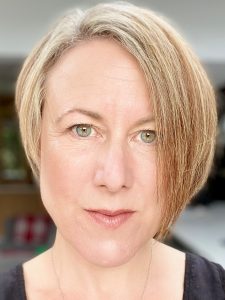 Tell us a bit about your career story so far.
Tell us a bit about your career story so far.
I’ve been at Sheffield Hallam since 2000. I joined as a lecturer after completing my PhD and a lectureship at Kingston University, and worked my way through to senior lecturer, principal lecturer, reader and now professor since 2015.
One of my first directions when I started at Sheffield Hallam was to champion health psychology within the teaching curriculum, at first in the undergraduate curriculum and then I led the development of our Masters in Health Psychology.
A turning point for me was a principal lecturer promotion opportunity that I didn’t get. I was incredibly disappointed but it made me take a step back, think about my career direction and really focus on research. The other thing that happened around that time was the small matter of having three children, between 2003-2007, which did impact on my ability to do research in the short term although I did manage to publish a few collaborative papers during this period.
Towards the end of this period I got a research leadership role within the department and from that point I established myself more in research and started to build a national profile. I was invited to join the British Psychological Society (BPS) Division of Health Psychology Research Committee and regularly attended and presented at national and interventional conferences.
I was successful in getting a readership in 2012 and then went on the ASPIRE programme and was given a mentor who persuaded me to apply for professor. I don’t think I would have done so otherwise. I think that was about me having a vision in my head of what a professor was, and me not looking like it. The professors who taught me at university were mostly older white men, as I remember. Focusing on the criteria and getting over the vision I had in my head was an important step.
What does it mean personally to you to be a professor at Sheffield Hallam? What do you value about it?
I was always ambitious and, for me personally, research is a really integral part of being an academic. To achieve professorship through a R&I pathway felt very rewarding. It’s also enabled me to have more control over the work I do and to focus my career much more on research, which is the direction I want to go.
If you could go back in time and give yourself some career advice, what would it be?
- Make sensible choices about the work you can choose to do. There are some things you have to do as part of your role. But then there are quite a lot of opportunities that arise or things that you can go and look for. Try to be strategic about which of those you take on. And be flexible enough that if opportunities come up you can take them.
- Becoming a research leader and having a national profile doesn’t just happen. You need to build that profile by going to conferences, serving on committees etc. I’ve had opportunities come up because someone is aware of my profile and has phoned me and asked if I’m interested in being involved in project and it’s led to a £2.5m grant.
Tell us about your work as a professor.
I’m the director of the Centre for Behavioural Science and Applied Psychology (CeBSAP), so as well as planning and directing my personal research, and getting involved in large collaborative bids, I’m also strategically identifying areas of growth for the research centre. That means working with a team of researchers to identify opportunities and bring in more research income. I lead on some projects, oversee some projects that the team delivers in an advisory capacity, as well as supporting the research leads team to offer research mentorship, development and support within the Department of Psychology, Sociology and Politics.
At a national level I work with the BPS to link public health with behavioural science, which has been especially relevant during Covid-19. I chair the Behavioural Science Hub Yorkshire and Humber, which is trying to integrate behavioural science into public health practice. I also sit on the BPS Disease Prevention and Behavioural Science Task Force. We’re a group of senior health psychologists from across the country who are trying to use our research and expertise to influence policy to help fight Covid-19. I’ve been involved in some media work, being interviewed on Radio 4, local radio and appearing on Newsnight. It has felt like I have had an opportunity to make a difference at a crucial time for public health.
I’m an editor of the British Journal of Health Psychology, which takes up a lot of my time, and I still teach on the MSc Health Psychology and supervise masters and doctoral students.
It’s really quite varied, which is what I love about it. I’d get really bored if I was just doing the same things all the time.